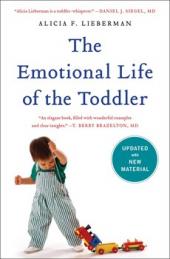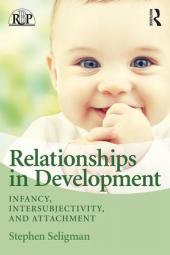By Nicholas Roznovsky
Two books from UC San Francisco Department of Psychiatry members are exploring the world of early childhood, specifically the emotions and relationships humans experience during their earliest stages of life.
Irving B. Harris Endowed Chair of Infant Mental Health and professor Alicia Lieberman, PhD, has released a second edition of her pioneering book, "The Emotional Life of the Toddler." Widely praised by experts and parents when it was originally published more than twenty years ago, Lieberman has revised and expanded the work with new and updated material reflecting the latest insight into the emotional lives of children between ages one and three.
Lieberman is the developer of child-parent psychotherapy, an evidence-based treatment for traumatized children from birth to five years of age that has shown efficacy in five randomized controlled studies. She has made major contributions to the field’s understanding of attachment, toddler development, and cross-cultural perspectives on early development through her research, writing, training, and consultation.
She is also the author of "Psychotherapy with Infants and Young Children: Repairing the Effects of Stress and Trauma on Early Attachment," "Don’t Hit My Mommy: A Manual for Child-Parent Psychotherapy with Young Children Exposed to Violence and Other Trauma," and numerous other publications. She is the director of the UCSF Child Trauma Research Program at Zuckerberg San Francisco General Hospital and Trauma Center, and is the recipient of the 2017 Whole Child Award from the Simms/Mann Institute, 2016 Rene Spitz Lifetime Achievement Award from the World Association of Infant Mental Health, and other honors.
Clinical Professor of Psychiatry Stephen Seligman, DMH, has also published a book looking at the lives of young humans: "Relationships in Development: Infancy, Intersubjectivity, and Attachment," as part of Routledge's Relational Perspectives Book Series.
The book examines the practical implications for dynamic psychotherapy with both adults and children, particularly following trauma. He offers examples of infant-parent interactions and of psychotherapeutic process as he traces the place of childhood and child development in psychoanalysis from Freud onward, showing how different images about babies evolved and influenced analytic theory and practice.
Seligman is also a clinical professor at the New York University Postdoctoral Program in Psychoanalysis and supervising analyst at the San Francisco Center for Psychoanalysis and Psychoanalytic Institute of Northern California. He is joint editor-in-chief of Psychoanalytic Dialogues and co-editor of Infant and Early Childhood Mental Health: Core Concepts and Clinical Practice.
About UCSF Psychiatry
The UCSF Department of Psychiatry and the Langley Porter Psychiatric Institute are among the nation's foremost resources in the fields of child, adolescent, adult, and geriatric mental health. Together they constitute one of the largest departments in the UCSF School of Medicine and the UCSF Weill Institute for Neurosciences, with a mission focused on research (basic, translational, clinical), teaching, patient care and public service.
UCSF Psychiatry conducts its clinical, educational and research efforts at a variety of locations in Northern California, including UCSF campuses at Parnassus Heights, Mission Bay and Laurel Heights, UCSF Medical Center, UCSF Benioff Children's Hospitals, Zuckerberg San Francisco General Hospital and Trauma Center, the San Francisco VA Health Care System and UCSF Fresno.
About the UCSF Weill Institute for Neurosciences
The UCSF Weill Institute for Neurosciences, established by the extraordinary generosity of Joan and Sanford I. "Sandy" Weill, brings together world-class researchers with top-ranked physicians to solve some of the most complex challenges in the human brain.
The UCSF Weill Institute leverages UCSF’s unrivaled bench-to-bedside excellence in the neurosciences. It unites three UCSF departments—Neurology, Psychiatry, and Neurological Surgery—that are highly esteemed for both patient care and research, as well as the Neuroscience Graduate Program, a cross-disciplinary alliance of nearly 100 UCSF faculty members from 15 basic-science departments, as well as the UCSF Institute for Neurodegenerative Diseases, a multidisciplinary research center focused on finding effective treatments for Alzheimer’s disease, frontotemporal dementia, Parkinson’s disease, and other neurodegenerative disorders.
About UCSF
UC San Francisco (UCSF) is a leading university dedicated to promoting health worldwide through advanced biomedical research, graduate-level education in the life sciences and health professions, and excellence in patient care. It includes top-ranked graduate schools of dentistry, medicine, nursing and pharmacy; a graduate division with nationally renowned programs in basic, biomedical, translational and population sciences; and a preeminent biomedical research enterprise. It also includes UCSF Health, which comprises top-ranked hospitals – UCSF Medical Center and UCSF Benioff Children’s Hospitals in San Francisco and Oakland – and other partner and affiliated hospitals and healthcare providers throughout the Bay Area.







